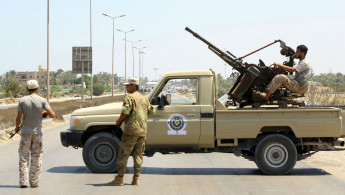UN urges calm ahead of Libya elections
The UN Security Council urged all Libyans on Thursday to improve the atmosphere for national elections in a resolution that avoids mentioning the December 10 target date for voting in the restive North African nation.
Instead, the council resolution adopted unanimously notes UN envoy Ghassan Salame's call "for parliamentary and presidential elections to be held in Libya as soon as possible, provided the necessary security, technical, legislative and political conditions are in place."
Libya descended into chaos following the 2011 uprising that toppled longtime dictator Muammar Gadaffi, who was later killed. The country is now split between rival governments in the east and west, each supported by an array of militias. Salame said last week it has recently lurched from one emergency to another.
On Tuesday, missiles were fired at Libya's capital of Tripoli, including the city's only functioning airport, less than a week after a UN-brokered a ceasefire between rival armed groups.
The resolution extends the mandate of the UN political mission in Libya until September 15 next year. It is has the task of supporting Libya's political transition, including the organisation of elections, as well as human rights monitoring and delivering aid if requested.
On May 29, rival Libyan leaders met in Paris and tentatively agreed on a roadmap leading to parliamentary and presidential elections on December 10.
French President Emmanuel Macron, who hosted the conference that included Prime Minister Fayez Sarraj, head of Libya's UN-backed government in Tripoli, and Gen. Khalifa Haftar, whose forces dominate eastern Libya, has said elections are crucial to stabilise the country.
Unified national security forces
While France supports the December 10 date for elections, the US, Italy and other European countries see that as too ambitious and are skeptical voting can be held that soon.
Last week, US deputy ambassador Jonathan Cohen warned at a Security Council meeting that "imposing false deadlines will backfire" and lead to worse divisions inside Libya.
Britain's UN ambassador, Karen Pierce, expressed the UK's support for holding elections this year, but said that "it will be necessary to ensure sufficient political, security and technical preparations are made so that they have the effect of uniting Libya."
"And it will be important to ensure a robust legal framework is in place and that there is sufficient political consensus to avoid exacerbating existing divisions in Libya," Pierce said.
The resolution adopted on Thursday strongly backs Salame and recognises his "key role" in consulting Libyan parties "to set the constitutional basis for elections and to adopt the necessary electoral laws."
The Security Council again called "on all Libyans to improve the atmosphere for national elections by all means possible." These include working toward unification of Libya's rival military and economic institutions, unifying and strengthening national security forces under the authority of the civilian government, and unifying the Libyan Central Bank, it said.
The council also stressed that "ensuring security and defending Libya from terrorism must be the task of unified and strengthened national security forces under the sole authority" of the UN-backed government.
Follow us on Twitter: @The_NewArab





 Follow the Middle East's top stories in English at The New Arab on Google News
Follow the Middle East's top stories in English at The New Arab on Google News


